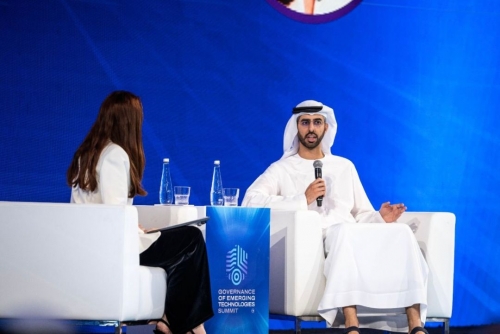Region joins push for safe tech
TDT | Manama
Email : editor@newsofbahrain.com
As governments worldwide grapple with the governance of emerging technologies, Gulf countries including Bahrain are aligning themselves with a broader international push for responsible innovation, ethical artificial intelligence, and stronger tech regulation.
The Governance of Emerging Technologies Summit (GETS 2025), which concluded yesterday in Abu Dhabi, brought together over 1,000 participants from more than 20 countries. Organised under the patronage of His Highness Sheikh Mansour bin Zayed Al Nahyan, the summit saw ministers, regulators, academics, and industry leaders converge to outline a strategic global framework for governing AI, quantum computing, Web3, and synthetic realities.
Shared Gulf Priorities
For the GCC, the summit served as a critical platform to align national strategies on education, public health, industrial innovation, and cyber defence with global standards. Ministers and technologists stressed the importance of embedding AI into national curricula, establishing ethical guidelines, and building inclusive institutions that can keep pace with rapid technological change.
From classroom reforms in the UAE to Bahrain’s growing investments in digital public services and AI start-ups, the region is working to build resilient frameworks that balance progress with protection.
Sector Focus
Sessions ranged from AI in healthcare and smart manufacturing to digital content rights and quantum regulation. Speakers from the UAE Space Agency, ADIB, Honeywell, M-PESA, and global firms like PwC and Binance joined discussions on securing data, addressing cross-border cyber threats, and preparing for decentralised finance systems.
The summit also spotlighted the role of youth councils from multiple emirates, signalling a GCC-wide effort to bring younger generations into policymaking on tech.
Global Consensus Building
GETS featured strong calls from INTERPOL, the UN Office on Drugs and Crime, and major consulting firms for international collaboration. A joint roadmap from TRENDS Research & Advisory and ASPIRE proposed accelerating global policy coordination and institutional readiness.
For Bahrain and its Gulf neighbours, the summit underscored the need to collaborate on harmonised regulation, ethical standards, and public-private partnerships to govern emerging technologies.
As the global tech landscape evolves, the GCC’s active role in shaping cross-border governance frameworks could determine how innovation unfolds across the region in the decade ahead.
Related Posts

